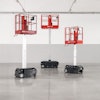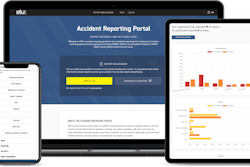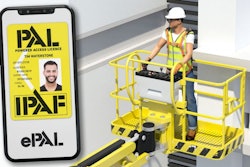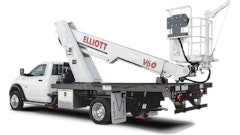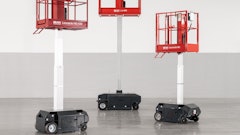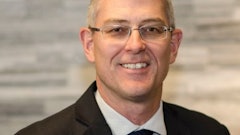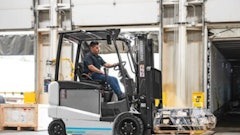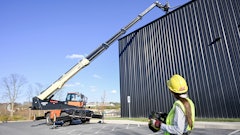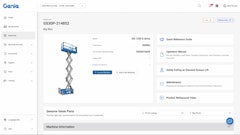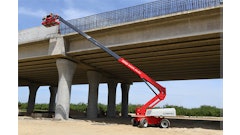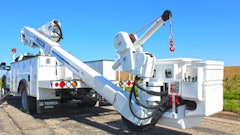
Sustainability, digitization, and adopting new technologies are the key to building from the COVID-19 pandemic, said presenters at this year’s IPAF Summit, hosted for the first time ever as a virtual event along with a digital prize-giving for the International Awards for Powered Access (IAPAs) back in March.
The theme of the IPAF Summit was the question of sustainability in powered access, the challenges of operating safely and effectively in the post-COVID-19 era, and the opportunities of digital and technological innovation for safer work at height.
Suzannah Nichol, CEO of Build UK, said during her Summit-opening presentation: “How do we grow and build sustainable businesses? Pay suppliers on time, treat staff well, and invest in new technology. That’s what IPAF and Build UK have in common. We also want to make our industry more efficient, reduce waste, and increase productivity.
“Finally, we focus on people: Recruiting, training, and retaining talent. Without the right people, we can’t operate. It is up to all of us to take our enthusiasm, passion, and skills into schools to encourage young people into our industry. How we train people is really important and IPAF is definitely a leading light in that department. We need to provide more apprenticeship places and encourage young people into them. Finally, working flexibly has seen a major shift in the past year. Everyone has the power to do things differently, every one of us has a part to play in making our industry better, and we all need to ask ourselves what part will that be?”
Søren Brogaard, CEO of Trackunit, presented along with Peter Douglas, CEO and managing director of IPAF, about the organizations’ collaboration in producing the new ePAL application for mobile devices, which is set to revolutionize the way operators store and share training certification – via digital PAL Cards – and log their equipment time.
It was also announced that IPAF would be establishing a new ePAL Committee that will drive future improvements to the app and wider safety of the industry, gathering feedback from IPAF members, equipment manufacturers, contractors, and most importantly, operators themselves.
Brogaard explained the app represents, “our commitment to enable collaboration between the operator and the digital eco-system.” He ran through a digital demo of the new ePAL app, adding: “We all know filling out or populating paper operator log-books has been a little bit of a challenge. For the first time, this app will offer a digital log of an operator’s activities that can be anonymized and shared to the benefit of the industry as a whole.
“We can also use the app to encourage and make it easier to report an accident or near-miss incident through the new IPAF reporting portal. My hope is we can all share in a safer, digital future for operators.”
Karel Huijser (JLG), Pierre Boels (Boels), and Norty Turner (United Rentals) closed the Summit in a virtual round-table discussion moderated by Murray Pollok, managing editor of Access International, who began by asking, “Is the powered access industry doing enough to be sustainable?”
Boels thought powered access was “in a good place,” but also remarked that, “everyone… wants power from wind turbines, but not necessarily in their backyard.” He felt the industry could be proactive in marketing cleaner electric-powered machines, but is limited by a need to balance costs and what customers are willing to pay.
Turner countered: “Is any industry doing enough? I don’t think so… but we need to push hard to find new opportunities to do more. Pierre is right; what will ultimately drive it is the economics behind it. Just look at the automotive industry; it is really starting to flip. We will need to see similar in the construction industry, to get the economic imperative in balance with what the market will pay.”
He referenced small incremental changes across United Rentals, such as switching to LED lighting, moving away from petroleum-based lubricants, and utilizing sophisticated routing software to reduce emissions from fleet deliveries. He felt the access industry was ahead of other industries in terms of the capability of electric machines and that contractor end-users are becoming more aware of sustainability across the board.
Huijser also drew comparisons with the automotive industry, emphasizing the importance of investing in and focusing on battery technology to drive innovation: “The awareness of this issue is good in Europe and especially in Scandinavia, and the U.S. is beginning to catch up in this regard and so demand for electric-powered solutions is rising there.”
Participants agreed the pandemic wouldn't halt the drive for sustainability; as Boels said: “Going green is irreversible.” It has presented opportunities to “go green,” such as less business travel and more use of video conferencing, but Norty said: “I believe events such as this will return to being ‘in-person’ once the pandemic is over.”
The presentations and discussions were interspersed by announcements of the category winners of the 2020-21 IAPAs, as well as video presentations from sponsors and a closing virtual delegate networking session.
Those wishing to view a recording of the IPAF summit can visit www.iapa-summit.info.
Information provided by IPAF and edited by Alexis Sheprak.




